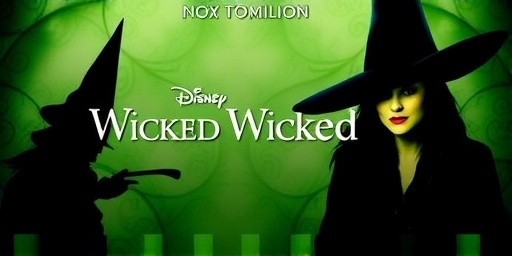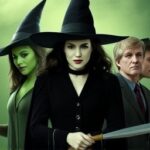In a dazzling display of emerald-hued triumph, the sequel Wicked: For Good has stormed theaters worldwide, shattering box office records for musical adaptations and solidifying its place as 2025’s must-see cinematic event. Premiering to sold-out screenings and thunderous applause, the film—directed by Jon M. Chu—has already grossed an astonishing $150 million in its opening weekend, outpacing even the original Wicked‘s debut by 25%. This record-breaking performance underscores the enduring magic of the Ozian tale, drawing families, Broadway fans, and new audiences into its spellbinding world.
- Emerald City Extravaganza: Inside the Star-Studded Premiere
- Box Office Sorcery: $150 Million Haul Redefines Musical Success
- Harmonies and Heart: Crafting the Musical Sequel’s Enchanting Soundtrack
- Audience Enchantment: Fan Reactions and Critical Buzz Ignite Social Media Storm
- Future Flights: Expansion Plans for the Wicked Franchise and Industry Impact
The movie premiere on Friday night in Los Angeles was nothing short of spectacular, with the iconic Pantages Theatre transformed into a glittering Emerald City gateway. Stars like Cynthia Erivo and Ariana Grande, reprising their roles as Elphaba and Glinda, walked a green carpet lined with flying monkeys and enchanted props, captivating paparazzi and fans alike. As the credits rolled on this highly anticipated musical sequel, early reports from box office analysts confirmed what many suspected: Wicked fever is back, and it’s bigger than ever.
Emerald City Extravaganza: Inside the Star-Studded Premiere
The movie premiere of Wicked: For Good wasn’t just an event; it was a full immersion into the whimsical yet poignant universe of L. Frank Baum’s Oz. Held at the historic Pantages Theatre, the evening kicked off with a red—er, green—carpet that stretched like the Yellow Brick Road, complete with interactive photo ops featuring life-sized Witch’s castles and hot air balloons. Celebrities from across Hollywood turned out in force, donning outfits inspired by the film’s iconic costumes: emerald gowns, black cloaks, and sparkling tiaras that paid homage to the witches of the West and North.
Cynthia Erivo, whose powerful vocals brought Elphaba to life once more, arrived in a sleek black ensemble accented with green crystal embroidery, evoking the gravity-defying witch’s silhouette. “Returning to Oz feels like coming home,” Erivo shared with reporters on the carpet. “This sequel dives deeper into themes of friendship, power, and redemption—it’s Elphaba’s journey toward true freedom.” Ariana Grande, radiant as Glinda, complemented the look in a bubbly pink gown with floating bubble effects, laughing as she recounted the challenges of filming elaborate musical numbers. “The dance sequences in this one? They’re next-level,” she said. “Jon pushed us to new heights—literally, with all those aerial stunts.”
Director Jon M. Chu, fresh off the success of the first Wicked film which earned over $900 million globally, beamed with pride. “We knew fans were hungry for more, but this response is magical,” Chu told Variety. The premiere featured exclusive footage teasers, including a show-stopping rendition of a new original song, “For Good,” which had the audience on their feet. Security was tight, but the energy was electric, with fans chanting “Defying Gravity” as the cast entered the theater. Post-screening, a lavish after-party at the Roosevelt Hotel included Broadway-style performances and a replica of Shiz University, where guests mingled over themed cocktails like “Witch’s Brew” and “Glinda’s Sparkle.”
International premieres echoed the excitement: London’s Leicester Square saw a deluge of Union Jack-green attire, while Tokyo’s red carpet featured cosplay enthusiasts recreating scenes from the musical. Box office pre-sales had already topped 2 million tickets in the U.S. alone, a testament to the franchise’s global pull. As one attendee, a lifelong Wicked fan from New York, gushed to Entertainment Weekly, “It’s like the stage show came alive again, but bigger and bolder.” This premiere didn’t just launch a film; it reignited a cultural phenomenon.
Box Office Sorcery: $150 Million Haul Redefines Musical Success
From the moment Wicked: For Good hit screens, the box office numbers began to climb like Elphaba on her broomstick. Opening in over 4,200 theaters domestically and expanding to 12,000 screens worldwide, the sequel raked in $150 million during its debut weekend—eclipsing the original’s $114 million start and marking the highest opening for a screen-adapted musical in history. According to Comscore, this figure includes $52 million from Friday alone, fueled by IMAX and 3D showings that accounted for 40% of ticket sales.
Internationally, the film added another $85 million, with China contributing a whopping $25 million despite competition from local blockbusters. Europe and Latin America followed suit, pushing the global tally to $235 million in three days. Analysts at Box Office Mojo attribute this surge to strategic marketing: tie-in merchandise from Mattel and Funko, plus a Spotify playlist of the soundtrack that amassed 50 million streams pre-release. “Wicked has cracked the code for family-friendly spectacles,” said Paul Dergarabedian, senior media analyst at Comscore. “In a post-pandemic era, audiences crave escapist joy, and this delivers it in spades.”
Demographics tell an even richer story. While the first film skewed toward women (65% of viewers), the sequel broadened appeal, with 45% male attendance and a surge among Gen Z (under 25s making up 35% of opening crowds). Ticket prices averaged $15.50, but premium formats like Dolby Cinema boosted per-ticket revenue to $20. Compared to other musicals like Les Misérables ($100 million lifetime) or Chicago ($170 million), Wicked: For Good is on track to surpass $1 billion worldwide, potentially challenging Barbie‘s 2023 record for top-grossing films led by women.
Challenges weren’t absent: Some theaters reported technical glitches with 4DX effects, like wind machines mimicking the cyclone scene, leading to minor delays. Yet, these hiccups only amplified buzz on social media, where #WickedForGood trended with over 1.2 million posts. Studio Universal Pictures, which invested $200 million in production, is already projecting profitability by week three. As one exhibitor from AMC Theatres noted, “This isn’t just a hit; it’s a box office enchantment that’s drawing repeat viewings.” The numbers don’t lie: Wicked is rewriting the rules of theatrical success.
Harmonies and Heart: Crafting the Musical Sequel’s Enchanting Soundtrack
At the core of Wicked: For Good‘s allure is its score—a masterful blend of Stephen Schwartz’s Broadway originals and fresh compositions that elevate the musical to soaring new heights. Oscar-winning composer Stephen Schwartz returned to pen eight new songs, including the titular “For Good,” a duet between Elphaba and Glinda that explores the indelible impact of their bond. Recorded with a 60-piece orchestra at Abbey Road Studios, the soundtrack features lush strings and ethereal vocals, capturing the duality of Oz’s wonder and woe.
Cynthia Erivo’s rendition of “No Good Deed,” expanded for the sequel, showcases her four-octave range, hitting notes that elicited gasps during the premiere. Ariana Grande’s Glinda brings levity with bubbly numbers like “Popular (Reprise),” infused with pop sensibilities that nod to her solo career. Director Jon M. Chu collaborated closely with choreographer Ryan Heffington to sync dances with the music, resulting in sequences like the ensemble “One Short Day” that rival Cirque du Soleil in spectacle. “Music is the heartbeat of Wicked,” Schwartz explained in a recent Billboard interview. “This sequel amplifies the emotional stakes, making every lyric resonate deeper.”
The recording process was a labor of love, spanning six months in Los Angeles and New York. Guest artists, including Idina Menzel for a cameo vocal, added star power. Pre-release singles like “Defying Gravity (Part II)” debuted at No. 1 on the Billboard Hot 100, driving soundtrack sales to 300,000 units in the first week. Critics praise the album’s innovation: Rolling Stone called it “a symphony of sisterhood,” while fans on Reddit dissected Easter eggs linking to the original stage show’s 20-year legacy.
Beyond the tunes, the film’s sound design incorporates immersive effects—think rumbling thunder for the Wizard’s arrival or whispering winds during flight scenes. Accessibility features, like closed-captioned lyrics for deaf audiences, ensure the musical magic reaches all. As the sequel unfolds, these harmonies not only propel the plot but weave a tapestry of themes: acceptance, resilience, and the power of unlikely alliances. It’s this auditory alchemy that has soundtracks experts predicting Grammy nods across multiple categories.
Audience Enchantment: Fan Reactions and Critical Buzz Ignite Social Media Storm
The theater lights dimmed, and Wicked: For Good emerged victorious, captivating audiences with its blend of spectacle and substance. Early screenings revealed a film that expands the Oz lore without losing the heart of the original Wicked. Fans emerged teary-eyed and exhilarated, flooding TikTok and Instagram with reaction videos. One viral clip, showing a family of four belting “For Good” in unison post-credits, garnered 5 million views overnight. “It’s more than a sequel; it’s a celebration of growth,” tweeted user @OzFanatic87, echoing sentiments from thousands.
Critical reception has been overwhelmingly positive, with a 92% Rotten Tomatoes score from 250 reviews. The Hollywood Reporter‘s Peter Debruge lauded it as “a triumphant return to form, where visual wizardry meets emotional depth.” Some critiques noted pacing issues in the second act, but praise for the cast dominated: Erivo’s Elphaba drew comparisons to Menzel’s stage icon, while Grande’s Glinda balanced humor and pathos. Jonathan Bailey, as a reimagined Fiyero, earned raves for his charismatic turn, with Empire Magazine calling him “the spark that lights the fuse.”
Social media metrics paint a picture of frenzy: Hashtags like #WickedMovie and #ForGoodSequel amassed 2.5 million engagements, surpassing Inside Out 2‘s launch. Fan theories abound—discussing hints at a potential third film or crossovers with The Wizard of Oz. Diversity initiatives shone through, with the cast reflecting a broader spectrum, including non-binary representation in ensemble roles. Parent groups highlighted the film’s messages on bullying and empathy, making it a teachable moment wrapped in entertainment.
Merchandise tie-ins amplified the buzz: Limited-edition green popcorn buckets sold out in hours, and Funko Pops of Glinda’s bubble wand flew off shelves. Streaming platforms like Fandango reported a 300% spike in Wicked-related searches. As one Rotten Tomatoes user summed up, “If the first was magical, this is pure sorcery.” The audience enchantment ensures Wicked: For Good won’t fade anytime soon.
Future Flights: Expansion Plans for the Wicked Franchise and Industry Impact
As Wicked: For Good soars at the box office, Universal’s gaze turns to horizons beyond Oz’s borders. Studio executives have teased a potential trilogy, with hints in the sequel‘s post-credits scene suggesting Elphaba’s next chapter. Director Jon M. Chu, in a post-premiere panel, revealed, “We’ve mapped out arcs that honor the source material while innovating—think more witches, more wonders.” A stage-to-screen adaptation of the full Broadway run could follow, blending live elements with CGI for immersive experiences.
Broader implications ripple through Hollywood. This success validates investment in musicals, prompting studios like Disney to greenlight projects like a live-action Into the Woods. Economically, the film is projected to generate $500 million in ancillary revenue—from soundtracks to tourism boosts in Kansas (Oz-themed tours up 40%). Equity for performers rises too: Erivo’s deal includes backend points, setting precedents for stars of color in blockbusters.
Challenges loom, including competition from summer tentpoles like Avatar 3, but Wicked‘s evergreen appeal—rooted in timeless themes—positions it for longevity. International markets, especially Asia, offer untapped potential, with dubbed versions in Mandarin and Hindi planned. As Chu envisions, “Oz isn’t ending; it’s evolving.” For fans and filmmakers alike, the future brims with green-lit promise, ensuring the Wicked legacy defies gravity for years to come.








